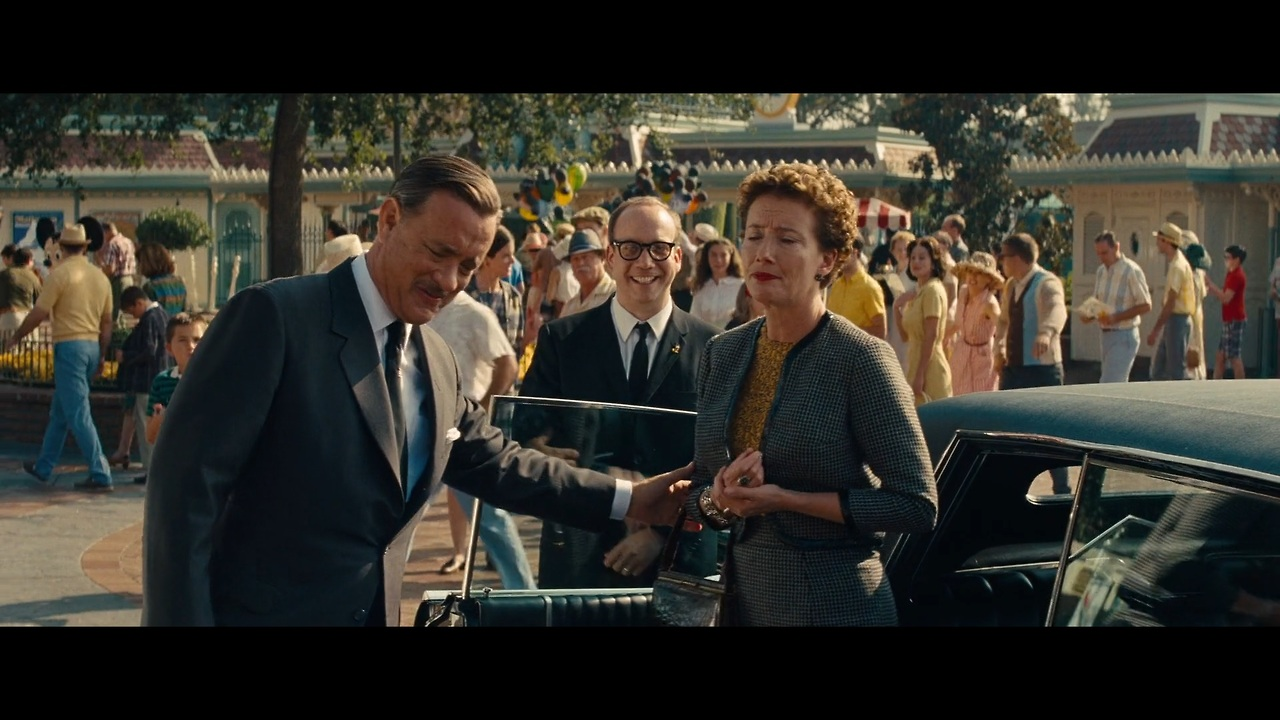Much like author P. L. Travers, Saving Mr. Banks spends the majority of its time trying to get us to like it. You poor film: you’re trying WAY too hard. When focused on the creative process in bringing Mary Poppins to the screen, Saving Mr. Banks lives up to all the praise being given to it. However, an overlong and meandering back story distracts and diminishes the emotional impact of the film. Save yourself the time, and just rewatch Mary Poppins; Saving Mr. Banks did remind me how wonderful that film makes anyone feel.
Mrs. Travers (Emma Thompson, forever reminding everyone that is how she wants to be called), is very hesitant to turn over the rights to Mary Poppins to Walt Disney (Tom Hanks). However, she does agree to aid in the writing process helmed by Don DaGradi (Bradley Whitford) and Richard (Jason Schwartzman) and Robert (BJ Novak) Sherman. The 3 clash with Travers immediately, since authenticity is more important to her than entertainment. The process makes Travers think back to why she chose to write the book: in the hopes to achieve the recognition she wants from her father (Colin Farrell).
This movie really tries to pour on the sadness with its flashbacks. Any chance at subtlety is thrown out the window at the very start; every scene is designed to elicit the most obvious emotion possible in the scene. They may be true, but cinematically they come off false; there is one scene in particular involving Travers’s mother at her lowest point that reeks of manipulation and unnecessary gravitas. The movie as a whole is pretty light-hearted; these scenes jar the viewer from the tone in a very forceful manner that keeps Saving Mr. Banks from ever reaching the same stratosphere as the movie it is describing. The only saving grace of the flashbacks involve the score, which is so beautiful, moving, and simple that it should be listened to in times of sadness to lift your spirits (credit goes to Thomas Newman, for putting a very wide smile on most audience members).
The strongest parts of Saving Mr. Banks involve the creative process, when Mary Poppins is being translated from book to screen. During these scenes you can see the dedication the author has to the character, and that the screenwriters and song writers have to the story. The process does not come without complications though; Travers story is so personal that giving up a piece of it is like giving up a part of her past she does not want to. However, watching her embrace the song numbers is a joy to behold; the flashbacks here help supply context and meaning for her letting go, and give Saving Mr. Banks emotional payoffs. It’s nice seeing a two-way street process as well; the writers and Disney himself reread Mary Poppins at the behest of Travers only to discover the true meaning of the story and rewrite the ending accordingly. Saving Mr. Banks mentions magic a lot, and the scenes bringing Mary Poppins to life give the movie its magic.
Emma Thompson, like any true Brit, can act appalled at American behavior with the best of them. Though she overacts a bit (and comes off too grating in the first part of the film), she earns the catharsis coming to her as PL Travers. Thompson has to make the audience root for her, and by the end I was firmly in her corner. Tom Hanks is getting the most buzz here playing Walt Disney, but I found the role lacks complexity. Hanks gets to wax poetic about storytelling and show off in front of a lot of people in the most charismatic way possible, very much in Hanks’s wheelhouse. Paul Giamatti gets a one note role and makes great work of it as Travers’s driver. BJ Novak, Bradley Whitford, and (especially) Jason Schwartzman play frustrated but enthusiastic writers very well. Colin Farrell and Ruth Wilson, though disserviced by the writing, are solid and believable as Travers’s parents.
For a movie describing the magic of storytelling and moviemaking, Saving Mr. Banks feels surprisingly inert. If more attention were paid to the creative process and less attention to Colin Farrell riding horseback through the countryside, then the movie would have to try less hard to win over the audience. Stroke of genius on Disney’s part though: Tom Hanks will make people forget just how merciless Walt Disney actually is; all it needed was Hanks smiling and a beautiful soul touching soundtrack.

